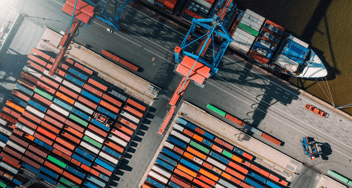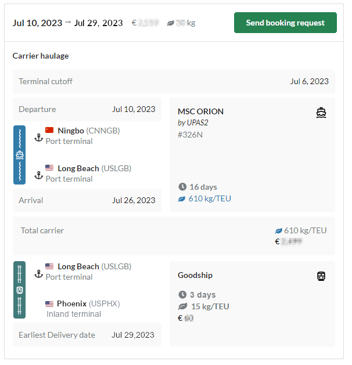How to Optimize Container Shipping for Food and Perishable Goods
Container shipping operations%20(1).jpg)
The global demand for perishable goods, has experienced tremendous growth in recent years, making it an attractive category in the food industry. According to the United Nations forecasting, there will be a 70% increase in production and distribution from 2010 to 2050. Shipping these goods via maritime transportation is one of the complex operations, increased by the need for proper packaging, timely delivery, and the potential for the supply chain disruptions with multiple sets of challenges... But, good news, the latest technologies and solutions can help to overcome these challenges.
In this article you will able to explore the challenges faced in the food industry and possible solutions to address them effectively.
1. Maximizing Efficiency
In the fast-paced food freight industry, efficiency is key, but container management and communication with multiple stakeholders can pose challenges. Any hiccups in the supply chain can damage the brand's reputation, making effective coordination and management vital for timely deliveries. To meet industry demands, it's essential to optimize efficiency and minimize time spent on container tasks to achieve the efficient shipping and delivery of large quantities of food by following strategies:- by using a Carrier Search Engine to consolidate partner routes and prices, finding carriers and establishing new partnerships is simplified.
- employing a centralized communication platform streamlines communication with shipping partners, eliminating delays and information loss.
- integrating tools into a single platform reduces time spent on redundant data entry, allowing for easier information access.
- leveraging automation through shipping management tools enables the duplication of shipments, saving time in reorganizing similar shipments and ensuring efficient organization.
2. Properly managing container
To ensure product quality in the cold chain, it is essential to have end-to-end visibility throughout the global supply chain. This goes beyond temperature control and involves monitoring container conditions using IoT devices to maintain product integrity during the journey. Additionally, it is crucial to respect capacity restraints to maximize space in shipping containers and reduce costs. Accurately measuring and weighing goods beforehand helps ensure smooth container loading, taking into consideration weight limits that may be reached before volume limits.
3. Effective communication
Smooth food logistics and successful international shipping are dependent on efficient and effective communication. Cross-cultural complexities, language barriers, and differences in time interpretation all require a clear and unambiguous information-sharing process. To ensure this, consider the following suggestions:
Avoid vague language: Certain elaborated communication can lead to miscommunication and end up into vague. Using an organized information-sharing process with closed questions and check boxes reduces ambiguity.
Don’t lose information buried in emails: Managing numerous emails with loads of information can results in losing or outdated information. Adopting a single platform where all collaborators can update and view information can facilitate the process.
Establish a clear channel of communication: With multiple stakeholders in the international supply chain, communication can become scattered across various tools that's leads to missed or delayed messages. Utilizing a centralized platforms like BuyCo can streamline communication and prevent information loss.
4. Fast & Prompt Shipping
The risk of shipment delays that can happen because of many factors, and can be detrimental to the goods due to the perishable nature. To mitigate these risks, consider the following:
Real-time information: Stay informed of any changes during the shipping process to address issues promptly. Use a centralized communication space for real-time updates, eliminating the need for constant emails or website monitoring.
Exception management tool: Investing in a tool that automatically connects with partners, provides container location updates, detects potential problems in advance, send alerts and brings relevant information can help you to save both time and money while ensuring efficient and reliable shipping processes.
5. Impeccable Customer Service
Customer service plays a crucial role in the food logistics industry. The quality of your customer service determines the reputation of your company and your brand image. Your customer service is the key differentiator in this competitive industry. Providing a exemplary customer service to your customers can create an edge.Keep customers in loop: Providing regular updates on the status of shipments will keep customers engaged and enable them to plan their operations accordingly.
Promptly address queries: Prioritizing proactive and timely communication will ensure customer satisfaction, even in challenging circumstances. By leveraging a shipping management system to provide real-time updates you will allow them to stay perfectly up-to-date.
6. Mixing Food Items in container
In maritime logistics, effective cargo container management is essential. It's critical to understand the fundamentals in order to reduce cargo claims and maintain quality.
Know the basics: To avoid cross-contamination, avoid scented goods when mixing different fruits and vegetables and make sure they are suitable in terms of ethylene generation, temperature, relative humidity, and odor creation. By comprehending these principles and ensuring diligent handling of shipping container contents, you can optimize storage capacity and uphold the integrity of your products.
7. Choosing 3rd Party Service Provider
Effective collaborations and partnerships are essential to international shipping success. The following factors should be taken into account when choosing third-party partners to handle your overseas shipments:
Experience matters: Choosing third party partners with experience in the complexities of international food shipping, including handling external difficult situations such as port shutdowns or customs issues and a strong local networks in the destination country can also be beneficial.Limit your freight forwarders to 2 or 3: Instead of numerous freight forwarders, choosing 2 or 3 reliable partners and establish long-term relationships can easily help in managing the performance tracking and collaboration. By selecting experienced and trusted freight forwarders and leveraging collaborative tools, can ensure smooth and timely shipments.
8. Branding as environmentally friendly organization
Logistics has a significant impact on the environment; shipping accounts for 2.2% of the world's carbon emissions. Additionally, 1.3 billion tons of foods are wasted or lost each year. Implementing technologies to enhance transportation systems, preservation techniques, and container conditions that can reduce food waste. The food waste can be reduce by gathering data, analyzing it, and take appropriate action.
Look for greener options: Selecting the most effective green routes for the shipments like short or direct route, frequently look for new routes, using of eco-friendly materials for packing, and implementing environmentally friendly activities for your shipment.
Be transparent: Tracking and disclosing your environmental footprint will help you gain the public's trust and promote sustainable behavior. A more sustainable logistics sector can be created by taking steps to encourage openness and better business practices.
9. Keeping logistics cost low
Increasing profitability requires minimizing transportation costs. Consider the following recommendations to increase operational effectiveness and reduce costs:
Keep detailed records: To identify and resolve any additional costs brought on by misunderstandings or unforeseen circumstances, gather and archive communications and documentation associated with each shipment.
Track contracts: Maintaining a record of contract details with carriers and freight forwarders, including the scope of work and expiration dates, to ensure efficient utilization of services without incurring extra fees.
Establish an exception management process: Investing in a maritime exceptions management technology will help you quickly detect and address shipment exceptions and delays, reducing the related expenses and risk of a cargo claim.
Monitor partner performance: Determine the effectiveness, reliability, and adherence to regulations of carriers and freight forwarders on a regular basis to prevent underperformance-related costs.
Utilize a shipping management system: Use a comprehensive shipment management system, such as BuyCo's, that provides real-time tracking, centralized communication, and other features to streamline operations and cut expenses. You can enhance operational effectiveness, cut costs, and boost profitability in your shipping processes by putting these techniques into practice.
Download the full e-book to learn in-depth insights about the challenges and solutions of food industry:
%20(1).webp?width=435&height=240&name=Example%201(New2)%20(1).webp)




.jpeg?width=352&name=iStock-1309560202%20(2).jpeg)